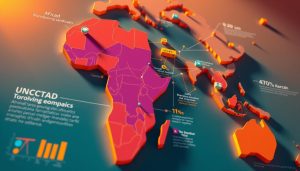Africa is a continent on the rise, full of business opportunities. It has a growing middle class and fast economic growth. Its markets are diverse and full of possibilities.
UK companies are drawn to Africa’s changes. The tech industry is booming, with giants like Microsoft and Siemens investing in energy and tech. This shows Africa is ready for business and technology.
Africa’s population is set to reach 2.5 billion by 2050. This means big markets for goods and services. The middle class is also growing, expected to reach 1.1 billion by 2030, boosting consumer spending.
Africa has lots of minerals, a huge mobile phone market, and a $300 billion digital economy by 2025. Over 60% of its workforce is young, making it a hub for innovation and growth.
This guide helps Start Company Formations and others see why Africa is key in today’s business world. It highlights the top 10 reasons to invest in Africa.
Introduction to Africa’s Business Landscape
Looking at Africa’s business scene, we see many positive signs. The economy is growing fast and opening up to investors. With a GDP growth of 4.1% in Sub-Saharan Africa from 2023 to 2025, it’s outpacing the world. This makes it a great place for foreign investment.
Investment in Africa is getting better, thanks to changes in energy and digital tech. Big companies are now looking at Africa for its market and business opportunities. The continent’s infrastructure is also improving, ready for more economic activities.
Political progress in some African countries is also helping. Places like Ghana and Rwanda are known for their stable politics and welcoming business policies. These are key for success in business.
- Botswana and Mauritius stand out for their political stability and good governance. Their clear legal systems attract foreign investment.
- There’s also a push for digital finance and payments across Africa. For example, Novissi in Togo uses new tech to improve economic inclusion.
- The African Continental Free Trade Area (AfCFTA) aims to boost trade within the region. It’s a big step towards creating the world’s largest free-trade area.
For companies like Start Company Formations, Africa offers great chances to grow. The long-term investment opportunities in Africa’s rich resources and market are exciting.
Overall, Africa’s growth and investment appeal are clear. Its economic progress is drawing in different investments. This is shaping its development and opening up new chances for global business partnerships.
Top 10 Reasons to Do Business in Africa
Africa’s story is changing fast, thanks to rapid economic growth. This growth is transforming the continent, making it attractive to investors. With a young population and more foreign investment, Africa is becoming a key place for businesses to grow.
Unprecedented Economic Growth
The economy in Africa is growing faster than the world average. Countries like Ethiopia are growing at nearly 10% each year. This growth comes from new sectors like tech and telecom, not just old ones like farming and mining.
Demographic Advantage of a Youthful Workforce
Africa’s young people are a big asset. The median age is about 19, much younger than in other parts of the world. This young, educated, and tech-savvy workforce is driving innovation and growth across the continent.
High Returns on Foreign Direct Investment
Foreign investment in Africa has hit US$45 billion in 2022. Investors are making good money, thanks to fast-growing sectors like tech and green energy. With the right policies, like the African Continental Free Trade Area, Africa is becoming more appealing to investors.
Expansive Resource Wealth
Africa is known for its rich resources, but now there’s a focus on using them wisely. From minerals to green energy, like Mauritania’s hydrogen, Africa’s wealth is attracting global industries.
Understanding Africa’s market can help businesses grow here. With good policies, a young workforce, and plenty of resources, investing in Africa is a smart move.
Understanding Africa’s Economic Growth Prospects
Africa’s economy is changing fast, thanks to strong GDP growth and digital innovation. The continent is not just keeping up; it’s often leading the way in economic growth. This makes Africa a very interesting place for businesses.
img src=”https://seowriting.ai/32_6.png” alt=”Digital Innovation in Africa”>
Predicted GDP Growth Rates
Africa’s GDP is growing at a rate higher than the global average over the last decade. This growth is due to better governance in countries like Mauritius and Botswana. It’s also thanks to investments in many sectors.
Experts say Africa’s GDP could reach $29 trillion by 2050. This would make Africa a major player in the global economy.
The Role of Digital Innovation
Digital innovation is driving Africa’s economy forward. Big improvements in telecommunications and internet access are key. Companies like Google and Orange are making a big impact in West Africa.
This new era in tech is changing traditional sectors. It’s making them more digital. This boost in digitalisation is helping GDP growth and improving Africa’s economic outlook.
These positive signs and digital innovation are opening up many opportunities for investors. Africa’s huge energy needs and the African Continental Free Trade Area (AfCFTA) are making it an attractive place for investment. These efforts are set to increase trade within Africa, making it more resilient and sustainable.
Africa is set for a bright economic future. It’s becoming a key player in global investments and digital innovation. By embracing digital advancements and understanding Africa’s changing economy, investors can make the most of its diverse markets.
Demographic Dividends: Africa’s Youthful Population
The idea of demographic dividends is key for Africa today. It’s about the economic growth from a population’s age change. Africa has 420 million youths, ready to boost the economy.
We’re working hard to use the young African workforce to its full. This big group offers chances for growth, innovation, and lasting success. By 2025, over 263 million young people could join the workforce, thanks to the AfCFTA.
- The number of working-age people is high, which means fast economic growth is possible.
- New technology will help absorb more workers and skip over old industrial stages.
But, there are also big challenges. The economy might face problems if the job market can’t keep up. We must plan carefully to use this chance for growth and improve life quality.
We’re dedicated to working with this young group for everyone’s benefit. By understanding these changes, we can make policies that meet the young workforce’s needs and skills.
Unlocking High Returns on Investment in Africa
Global investors look for places with big investment opportunities. Africa is a top choice with its growing appeal. In 2023, it saw a record US$48 billion in foreign investment. This shows the continent’s strong market and the chance for high investment returns.
The African Continental Free Trade Area (AfCFTA) has played a big role. It’s not just a trade deal but a game-changer. It boosts Africa’s investment attractiveness and opens up new markets.
- The AfCFTA is a key player in Africa’s global investment scene. It boosts the continent’s investment opportunities.
- This trade area makes it easier for foreign investors to enter the market. It’s full of chances for growth.
- Different sectors like tech and agriculture are growing fast. This means big chances for making money.
Looking at tech and agriculture, we see many chances for making money. Tech startups in Africa raised US$6 billion in 2023. Countries like Côte d’Ivoire and Ghana are leaders in cocoa production. These areas promise good investment returns and help the continent grow.
- Investing in Africa’s tech, like in Kenya and Nigeria, could bring big returns. These countries are leading in fintech.
- The manufacturing sector, with its growing demand, is also promising. It has a growth rate of up to 6.4%.
In short, Africa’s investment opportunities are growing. This is thanks to better trade policies and regional integration. The AfCFTA has made the business environment better. This makes Africa a great choice for investors looking to grow their business.
Navigating Legal and Regulatory Frameworks
In Africa, the legal framework is always changing. This helps make it easier to do business across the continent. At Start Company Formations, we help your business navigate these changes. We make sure you understand the rules and follow them.
Places like Morocco are showing big improvements in doing business. This is because of simpler rules that help businesses grow. These changes are key for companies looking to expand in Africa.
We offer a wide range of legal and advisory services. We help with contracts, protect your ideas, and plan for taxes. This keeps your business running smoothly and efficiently.
- Contract review and standardisation: Helps keep deals fair and avoid disputes.
- Intellectual property guidance: Keeps your new ideas safe in different countries.
- Strategic entry planning: Gives advice on rules and taxes in new markets.
In places like Nigeria, businesses must think about the environment. Not following the rules can lead to big fines, like Sasol’s $1.4 million penalty. It’s very important to follow these laws.
Reforms are also getting more support from countries like the UK. They invest in areas like agriculture, showing they trust Africa’s laws. We also help with mergers, acquisitions, and corporate governance to build trust and transparency.
Keeping up with legal changes is key. With over 60% of African countries changing their laws, our team helps you stay on top. This reduces risks and increases your business’s chances of success.
Understanding legal details can be tough. In Africa, 54% of people find tax rules hard to grasp. We offer custom tax advice to help you make the most of your finances while following the law.
In short, dealing with Africa’s changing laws needs a partner who knows the local rules well. At Start Company Formations, we help your business take advantage of these changes. This makes doing business in Africa easier and more profitable.
Exploring Africa’s Rich Resource Base
Africa is full of natural resources and has a big share of the world’s minerals. This shows the continent’s key role and its chance to build a sustainable economy. We will look into how managing natural resources and renewable energy can lead to a thriving business scene.
Natural Minerals and Metals
Africa has huge reserves of precious metals and minerals. Countries like Botswana, Ghana, and South Africa have lots of diamonds and gold. There’s also a lot of cobalt and manganese, key for tech and energy.
This makes Africa very important in the global minerals market. It attracts investments to improve mining and processing.
- Substantial mineral reserves offer numerous opportunities for mining companies.
- Investment in technological advancements can enhance efficient extraction and processing methods.
- Partnerships with local governments ensure that mining activities contribute positively to the economic growth of the region.
Renewable Energy
Africa has a huge chance for renewable energy, like solar, wind, and hydro. Kenya and Ethiopia are leading in geothermal projects. The Sahara Desert is also a big chance for solar energy.
This move to renewable energy fights climate change and opens up new chances for growth.
- Initiatives to harness solar and wind energy are being scaled up, reflecting an intensive push towards renewable sources.
- Investments in infrastructure to support green energy production are increasingly viewed as both profitable and essential.
- Developing renewable energy markets in Africa aligns with global sustainability goals, giving international investors a chance to invest in something both profitable and responsible.
In summary, looking at Africa’s resources and renewable energy shows a lot of chances. We must use these chances wisely for sustainable and fair growth. Investing in Africa’s resources can bring big rewards, not just money but also a sustainable future.
Leveraging Infrastructure Improvements for Business Growth
At Start Company Formations, we know that infrastructure development is key for Africa’s economic competitiveness. Fixing infrastructure gaps creates big investment opportunities. This leads to new economic activities and better regional ties.
The African Development Bank says there’s a huge gap in infrastructure funding, around USD 68 to 108 billion a year. This gap is a chance for investors to grow in areas like telecoms and green energy. For example, energy costs in Africa are much higher than in other places, showing big gains from better infrastructure.
- High energy costs are a challenge but also a chance to invest in better, greener energy.
- Telecoms are expensive, costing four times more than in South Asia. This shows the need for cheaper, better ICT solutions.
- High road freight costs, double those in the United States, show the need for better roads to cut costs and improve market access.
The Africa Union’s i3 programme is a big step towards economic growth through new infrastructure. It supports 60 African startups, boosting local innovation and attracting over $50 million in funding. This creates nearly 1,000 jobs and helps reduce the infrastructure gap, boosting economic competitiveness and connectivity.
The African Continental Free Trade Area (AfCFTA) is set to increase intra-African freight demand by 28% after it starts. This makes strong infrastructure even more important. Better infrastructure will help AfCFTA work better, making trade smoother and cheaper across regions.
As countries work to fix their infrastructure, it’s clear that these efforts are vital for growth and investment in Africa. Investing in infrastructure opens up many business opportunities and deepens economic ties.
Capitalising on Emerging Markets and Consumer Trends
Africa’s emerging markets are full of growth and chances, mainly in the consumer goods sector. Almost 90% of the world’s workers are in emerging markets like Africa. This means a big increase in economic activity, attracting investors and businesses worldwide.
Consumer habits in these markets are changing fast. A growing middle class with more money and different tastes is opening up new opportunities. This growth is not just about more people but also about better quality and variety in what they buy.
Banking transformation is also a big trend. Digital banking has changed how we do money, making it easier for more people to use banks. This change is not just about new tech but also about making banking more accessible everywhere.
Telecoms and banking working together has made banking services reach more people. Efforts to link African markets, improve rules, and work together regionally are making the financial scene stronger. This makes it more attractive to investors from around the world.
- Emerging markets are home to 85% of the world’s people and play a big part in global GDP growth.
- The consumer goods sector in Africa is full of chances as the middle class grows, thanks to good demographics and more cities.
- Banking is changing with digital innovation, making it easier for more people to get financial services and be part of the economy.
Africa’s emerging markets offer exciting chances, mainly in areas that affect daily life and making the economy more inclusive. With these trends, the consumer goods and banking sectors are set to lead Africa’s economic growth. They offer unique chances for growth and investment.
The Rise of the African Middle Class
The African middle class is growing fast, changing the continent’s economy. By 2030, over 1.1 billion people will join this class. This will bring new consumer habits and chances for e-commerce.
Studies show the middle class is reshaping urban life and the economy. They are building homes on the outskirts of cities and boosting economic activities. This includes a big rise in e-commerce.
- More people are shopping online, looking for ease and convenience.
- Investments in digital infrastructure are making e-commerce key for retailers in Africa.
- Online shopping is expected to grow fast, with Africa’s e-commerce set to reach 40% by 2025.
Marketing that understands African culture and consumer habits is key. The growing middle class is driving demand for food and goods. This is great news for retail and online markets.
The African middle class is becoming more powerful in the economy. Retail and e-commerce must adapt to these changes. By 2030, the middle class will significantly improve Africa’s economy.
Enhanced Political Stability and Economic Policies
The African economic scene is growing, thanks to political stability and economic reforms. Countries like Botswana, Mauritius, and Seychelles are leading the way. They show how good governance and smart economic plans can lead to success.
Our work on economic policies and fighting corruption has shown that clear government actions boost investor trust. This trust is key for starting and growing businesses that help the economy grow over time.
Reforms Boosting Business Confidence
In places like Namibia and Senegal, respect for the law and strong institutions have made their economies more stable. This stability attracts foreign investment, thanks to smart economic reforms. For example, Mauritius’s strong democracy and independent courts have made it a great place for business.
Across Africa, we see big steps forward in infrastructure and women’s rights. These changes help support business growth and diversification.
Focus on Anti-Corruption Measures
Combating corruption is now a key focus in improving Africa’s business environment. Seychelles and Liberia are leading the charge, with Seychelles ranking first in governance. This progress is key for creating a fair business environment.
Our advice at Start Company Formations ensures companies entering Africa go into places known for transparency and fairness.
The growth in political stability and economic reforms across Africa is very promising. It shows a new path for the continent’s economy. It’s an exciting time for business in Africa, driven by a push for reform and against corruption.
The Digital Economy: A Gateway to Innovation
Africa is changing fast, and the digital economy is key. Internet use and fintech are growing, opening new paths for growth. Our company is ready to help by using digital tech for better development.
Numbers show Africa’s digital growth. Internet users in Sub-Saharan Africa jumped by 115% from 2016 to 2021. This means more people are online, ready for business and investment. The digital economy is expected to grow from $180 billion in 2025 to $712 billion by 2050.
Big names are investing in Africa’s digital future. The World Bank and the U.S. are giving millions to improve digital services. This is a big step towards better digital services in Africa.
Mobile banking and e-commerce are booming. Mobile money has changed how we pay, making it key for businesses. With more phones and people online, e-commerce is growing, thanks to more people using the internet.
- Internet use in sub-Saharan Africa is growing fast, thanks to cheaper access and better services.
- The telemedicine market is growing, reaching $6.4 billion by 2027, showing digital health’s promise.
But, there are hurdles like a lack of digital skills and a gap between men and women online. Only 11% of university graduates in Africa have digital training. Women are 43% less likely to use the internet than men. We need to close these gaps for a digital economy that works for everyone.
We want to help UK businesses succeed in Africa’s digital world. We focus on growth that is sustainable and fair, creating chances that match Africa’s digital dreams.
Africa’s Strategic Role in Global Value Chains
Africa is a diverse and rich continent, playing a key role in global value chains. It offers many export chances and has the chance to grow its manufacturing. This is thanks to its young workforce and natural resources. Africa is becoming a major player in the global market and a key trade and investment hub.
Africa is focusing on improving its local manufacturing and joining global trade. This makes it attractive to big companies and investors. They see the chance to enter new markets and grow their businesses. The focus on local value chains in agriculture and manufacturing is creating new export chances and attracting foreign investment.
- Export and Import Needs: Africa has a lot to offer, with almost 30% of the world’s mineral reserves and 65% of its arable land. This supports local growth and meets other regions’ needs. The sector is growing, thanks to resources like gold, cobalt, and platinum for electronics and renewable energy.
- Investment in Manufacturing and Services: The growing manufacturing and service sectors offer great investment chances. Countries are setting up special economic zones and industrial parks to help businesses grow. The location of some countries near open waters also boosts trade, making economic integration stronger.
Africa’s role in global value chains is helping its economy grow. It’s also making a big impact on global commerce. This offers a bright future for trade and investment worldwide.
Partnering with Start Company Formations for African Ventures
As we look to make the most of Africa’s business opportunities, forming strong partnerships is key. Start Company Formations is our go-to for entering the market. Together, we aim to tackle the challenges of Africa’s economy, where diverse markets and innovation promise big rewards.
Start Company Formations knows the local markets well, helping us use tax breaks and better policies. Our work together is set to boost growth and achieve significant results. In 2021, African firms made over $150 billion, showing the region’s economic strength.
The digital world is changing fast in Africa, with more use of blockchain and cryptocurrency. With SMEs making up to 90% of businesses in some areas, there’s a lot of room for growth. Success stories like Kenya’s “Silicon Savannah” show the power of tech in Africa’s economy.












